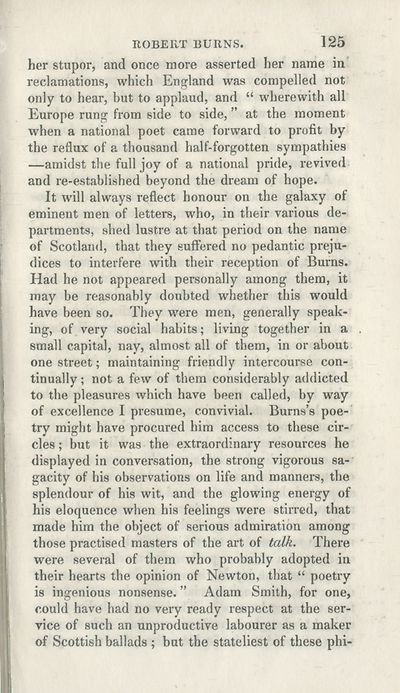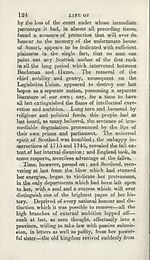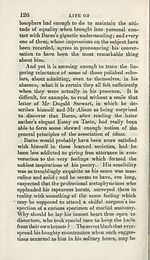Scotland/Scots > Life of Robert Burns
(135)
Download files
Complete book:
Individual page:
Thumbnail gallery: Grid view | List view

ROBERT BURNS. 125
her stupor, and once more asserted Iier name in
reclamations, which England was compelled not
only to hear, but to applaud, and “ wherewith all
Europe rung from side to side, ” at the moment
when a national poet came forward to profit by
the reflux of a thousand half-forgotten sympathies
—amidst the full joy of a national pride, revived
and re-established beyond the dream of hope.
It will always reflect honour on the galaxy of
eminent men of letters, who, in their various de¬
partments, shed lustre at that period on the name
of Scotland, that they suffered no pedantic preju¬
dices to interfere with their reception of Burns.
Had he not appeared personally among them, it
may be reasonably doubted whether this would
have been so. They were men, generally speak¬
ing, of very social habits; living together in a
small capital, nay, almost all of them, in or about
one street; maintaining friendly intercourse con¬
tinually ; not a few of them considerably addicted
to the pleasures which have been called, by way
of excellence I presume, convivial. Burns’s poe¬
try might have procured him access to these cir¬
cles ; but it was the extraordinary resources he
displayed in conversation, the strong vigorous sa¬
gacity of his observations on life and manners, the
splendour of his wit, and the glowing energy of
his eloquence when his feelings were stirred, that
made him the object of serious admiration among
those practised masters of the art of talk. There
were several of them who probably adopted in
their hearts the opinion of Newton, that “ poetry
is ingenious nonsense. ” Adam Smith, for one,
could have had no very ready respect at the ser¬
vice of such an unproductive labourer as a maker
of Scottish ballads ; but the stateliest of these phi-
her stupor, and once more asserted Iier name in
reclamations, which England was compelled not
only to hear, but to applaud, and “ wherewith all
Europe rung from side to side, ” at the moment
when a national poet came forward to profit by
the reflux of a thousand half-forgotten sympathies
—amidst the full joy of a national pride, revived
and re-established beyond the dream of hope.
It will always reflect honour on the galaxy of
eminent men of letters, who, in their various de¬
partments, shed lustre at that period on the name
of Scotland, that they suffered no pedantic preju¬
dices to interfere with their reception of Burns.
Had he not appeared personally among them, it
may be reasonably doubted whether this would
have been so. They were men, generally speak¬
ing, of very social habits; living together in a
small capital, nay, almost all of them, in or about
one street; maintaining friendly intercourse con¬
tinually ; not a few of them considerably addicted
to the pleasures which have been called, by way
of excellence I presume, convivial. Burns’s poe¬
try might have procured him access to these cir¬
cles ; but it was the extraordinary resources he
displayed in conversation, the strong vigorous sa¬
gacity of his observations on life and manners, the
splendour of his wit, and the glowing energy of
his eloquence when his feelings were stirred, that
made him the object of serious admiration among
those practised masters of the art of talk. There
were several of them who probably adopted in
their hearts the opinion of Newton, that “ poetry
is ingenious nonsense. ” Adam Smith, for one,
could have had no very ready respect at the ser¬
vice of such an unproductive labourer as a maker
of Scottish ballads ; but the stateliest of these phi-
Set display mode to:
![]() Universal Viewer |
Universal Viewer | ![]() Mirador |
Large image | Transcription
Mirador |
Large image | Transcription
| Antiquarian books of Scotland > Scotland/Scots > Life of Robert Burns > (135) |
|---|
| Permanent URL | https://digital.nls.uk/108247479 |
|---|
| Description | Thousands of printed books from the Antiquarian Books of Scotland collection which dates from 1641 to the 1980s. The collection consists of 14,800 books which were published in Scotland or have a Scottish connection, e.g. through the author, printer or owner. Subjects covered include sport, education, diseases, adventure, occupations, Jacobites, politics and religion. Among the 29 languages represented are English, Gaelic, Italian, French, Russian and Swedish. |
|---|

